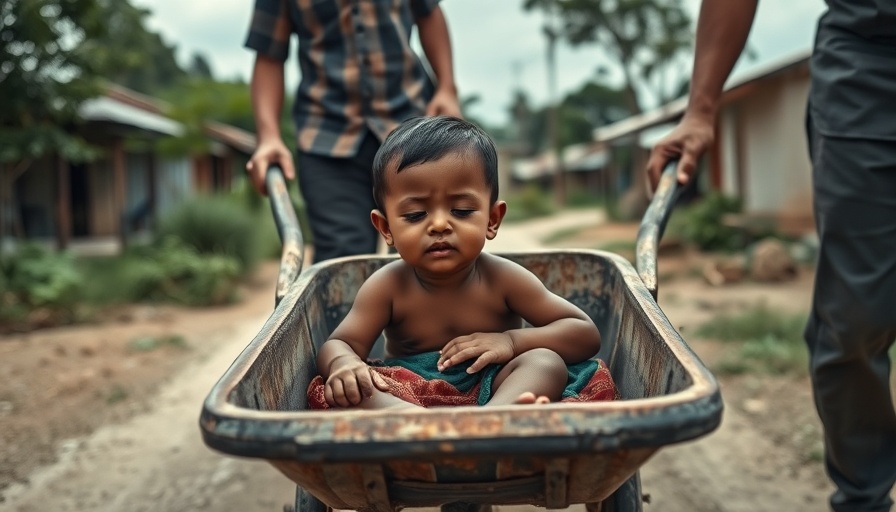
Cholera Outbreak Sees Shocking Rise in Global Deaths
The World Health Organization's recent report highlights a staggering 50% increase in cholera-related fatalities in 2024 compared to the previous year, emphasizing an ongoing health crisis affecting some of the world's most vulnerable populations. With over 6,000 lives lost and nearly 560,000 infections recorded across 60 countries, the cholera epidemic’s dark cloud looms particularly over Africa, the Middle East, and parts of Asia, accounting for a significant 98% of global infections.
In WHO: Cholera deaths up by 50% in 2024, the discussion dives into the urgent health crisis, exploring key insights that sparked deeper analysis on our end.
Understanding Cholera and Its Catalyst Factors
Cholera, an intestinal infection caused by the bacterium Vibrio cholerae, thrives in environments lacking proper sanitation. It spreads swiftly through contaminated water, underlining the critical requirements for potable water access and hygiene practices. Unfortunately, the current situation is exacerbated by various factors, including ongoing conflicts, climate change, and widespread population displacement. Such realities reveal not just a health crisis but a multi-faceted problem requiring comprehensive strategic intervention.
The Role of Infrastructure in Disease Control
Inadequate water, sanitation, and hygiene (WASH) infrastructure remains a formidable barrier in combatting cholera. Many regions in Africa, the Middle East, and South Asia struggle with these foundational issues, which are crucial in minimizing disease transmission. Reports indicate that as the infrastructure fails to strengthen, the risk of outbreaks rises dramatically, emphasizing the urgent need for global partners to prioritize investment in these life-saving resources.
Impact of Climate Change on Cholera Spread
Climate change has emerged as a significant player in the spread of cholera. Extreme weather events and changing weather patterns contribute to worsening sanitation conditions and increased flooding, creating fertile grounds for cholera bacteria to flourish. As countries grapple with the expanding footprints of climate impacts, the interplay between environmental factors and public health continues to underline the necessity of integrated solutions that encompass environmental stability and health security.
Exploring the Broader Implications of the Cholera Crisis
The recent cholera outbreaks also raise crucial questions about governance and public health policy effectiveness. In nations grappling with conflict and social unrest, public health systems are often the first to suffer. This highlights systemic weaknesses and the dire need for accountability in the management of health crises. As communities face the immediate effects of outbreaks, the conversation must shift toward sustainable health policies that are equitable and robust enough to withstand underlying socio-political pressures.
What Can Be Done? Engaging Global Partnerships and Local Communities
Tackling the cholera crisis will require a concerted effort from international organizations, governments, and local communities. Increased funding for health infrastructure, enhanced public health monitoring, and community education on hygiene practices are essential in mitigating the spread of cholera. Global health partnerships, particularly in developing regions, must emphasize hard infrastructure development alongside soft initiatives like public health education and community engagement.
Looking Ahead: Ensuring Resilience Against Future Outbreaks
The preliminary data surrounding cholera's continuation into 2025 is a formidable reminder of the continuous threat posed by this preventable disease. As we look ahead, it is crucial to bolster healthcare response mechanisms both to address current outbreaks and to build resilience against future crises. Schools, healthcare facilities, and community centers should work together to ensure that a strong foundation on health education exists to empower individuals and communities against infectious diseases.
The stark realities laid out in the WHO report make it clear: cholera is not just a health issue; it's a matter of global and local governance, environmental stewardship, and community empowerment. As public health officials work to contain this disease, the global community must not turn a blind eye—every action taken today is crucial for securing a healthier tomorrow.
To stay informed about developments in the battle against cholera and its larger implications on global health and governance, consider following updates from reliable news channels focusing on Africa News and global health initiatives. Understanding the intertwining of health, politics, and social factors is vital for cultivating informed civic engagement.
 Add Row
Add Row  Add
Add 




Write A Comment